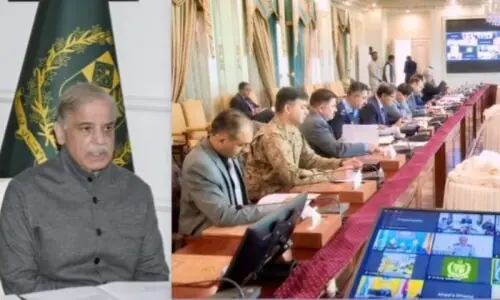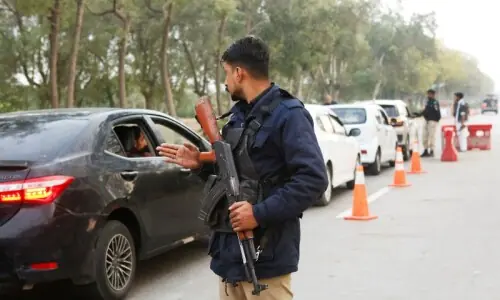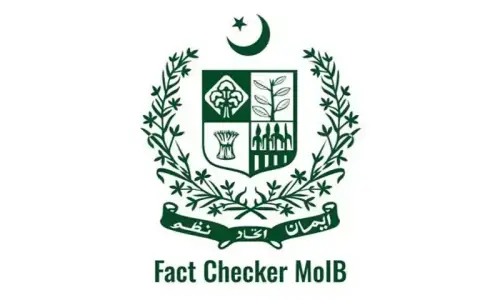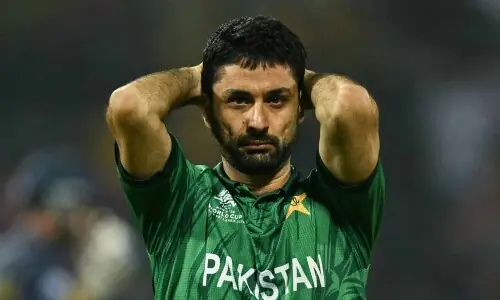Maulana Fazlur Rehman heads his own faction of the Jamiat Ulema-i-Islam, a party which was initially headed by his father Maulana Mufti Mahmoud, a religious scholar and political leader who was the chief minister of NWFP (now Khyber Pakthunkhwa) in the 1970s.
Early entry into politics
Fazl, who was born in Dera Ismail Khan in 1953, took over the JUI’s reins in 1980 at the age of 27, when his father died. The party then split into two in the mid 80s – the JUI-F, led by Fazl, and the JUI-S, led by Samiul Haq – over whether to join Ziaul Haq’s government and also allegedly over personal differences. Like his father, Fazl draws his support from followers of the Deobandi school of thought which is part and parcel of JUI-F’s ideology.
Fazl, with his father’s legacy in hand, emerged as the leader of the more powerful faction.
Although the party claims to hold intra-party elections every three years, Fazl has been its Ameer since 1980.
Aside from having the most important job in his party, the ameer has also played a vital role in electoral politics – Fazl has been elected to Parliament four times: 1988, 1993, 2002 and 2008. He has lost the elections twice: in 1990 and 1997. The JUI-F chief mostly runs from NA-24 (Dera Ismail Khan), a seat which has been closely contested between him and Faisal Karim Kundi of Pakistan Peoples Party (PPP) in the past. In the 2008 election, Fazl lost to Kundi in NA-24 but won a seat from Bannu.
Hardliner or pragmatic politico
The maulana, as he is popular known, has a history of flip-flopping often with his political alliances as well as his ideological stances. The JUI-F has historically espoused the imposition of Shariah law in Pakistan, however, it has also formed alliances with otherwise secular political groups.
After the 1988 election, the right-wing maulana decided to side with the centre-left government of PPP’s Benazir Bhutto. However, at the same time, Fazl cultivated his connections with the Afghan Taliban – a link that proved to be predominantly behind his influential position in Pakistani politics. The Afghan Taliban were originally seminary students living in refugee camps in Pakistan’s northwest and in Balochistan – some of them managed by Fazl’s JUI.
The party chief became a more powerful figure during Benazir’s second term when he was appointed chairman of the National Assembly’s standing committee on foreign affairs. Fazl was hence able to build up an extensive number of contacts, particularly across the Middle East, reportedly in order to secure international backing.
In 2001, after the US invasion of Afghanistan, Fazl remained staunchly pro-Taliban and spoke out vehemently against former military ruler Pervez Musharraf’s support for the “War on Terror”. This ultimately led to the maulana’s house arrest – but it was only a prelude to his eventual release in March 2002 and the withdrawal of all cases against him.
With this freedom, Fazl decided to contest the 2002 election under the umbrella of the Muttahida Majlis-i-Amal – a conglomerate of six right-wing religious parties which included JUI-F, Jamaat-i-Islami and JUI-S. On the cusp of the 2002 polls, he was considered a serious candidate for the post of prime minister – although this job eventually went to Mir Zafarullah Khan Jamali, then a relatively unknown politician from Balochistan. Later in 2008, Fazl contested the election over three broad ideas – anti-Americanism, support for Afghan Taliban and imposition of Sharia law in Pakistan.
Although MMA won enough seats, the maulana changed tack, declaring that his party was interested in friendly ties with the America, a signature move for Fazl who was once described in a US embassy cable released by WikiLeaks as “more of a politician than a mullah”. Behind the scenes as well, the JUI-F chief has proven to be a “frequent and cooperative interlocutor” with the American mission in Pakistan. In 2007, he even tried to convince the US to back him as a prime ministerial candidate over Benazir.
On and off with MMA, Taliban
By the time the 2008 election came around, Fazl had done an almost 180 degree turn. He distanced himself from the Taliban, sold himself to the public as a moderate and entered the government via JUI-F as opposed to MMA which had been rendered defunct by then. Fazl’s party which had initially joined the federal government as part of the PPP-led coalition later parted from it and joined the opposition.
With this distance from the Taliban came attacks against the maulana, who was no longer their blue-eyed boy. In 2011, there were two back-to-back bomb attacks that targeted Fazl, who narrowly escaped both.
As part of the opposition, Fazl continued to play an important political role despite his party’s small presence in Parliament. He moreover seems to have made his way back into the Pakistani Taliban’s good books after sponsoring an All Parties Conference which called for negotiations with “stakeholders”. The APC followed Fazl’s meeting with representatives of the Afghan Taliban in Qatar.
In addition, Fazl revived MMA in 2012 – although without the much needed support of JUI-S and JI. One of the reasons believed to be behind these parties’ lack of support for MMA’s revival was Fazl himself, whom they labelled an ‘opportunist’ who is only interested in power as opposed to upholding the principles of Shariah. Fazl has said that during the 2008-2013 government’s tenure, the Kashmir issue had been badly neglected. He was also in the headlines for his controversial statement over the shooting of Malala Yousufzai where he had called the attack on the child rights activist a ‘drama’. He was also adamantly against the restoration of Nato supply lines in 2012, once again indicating a turn towards a more hardline stance.
— Research and text by Heba Islam




























